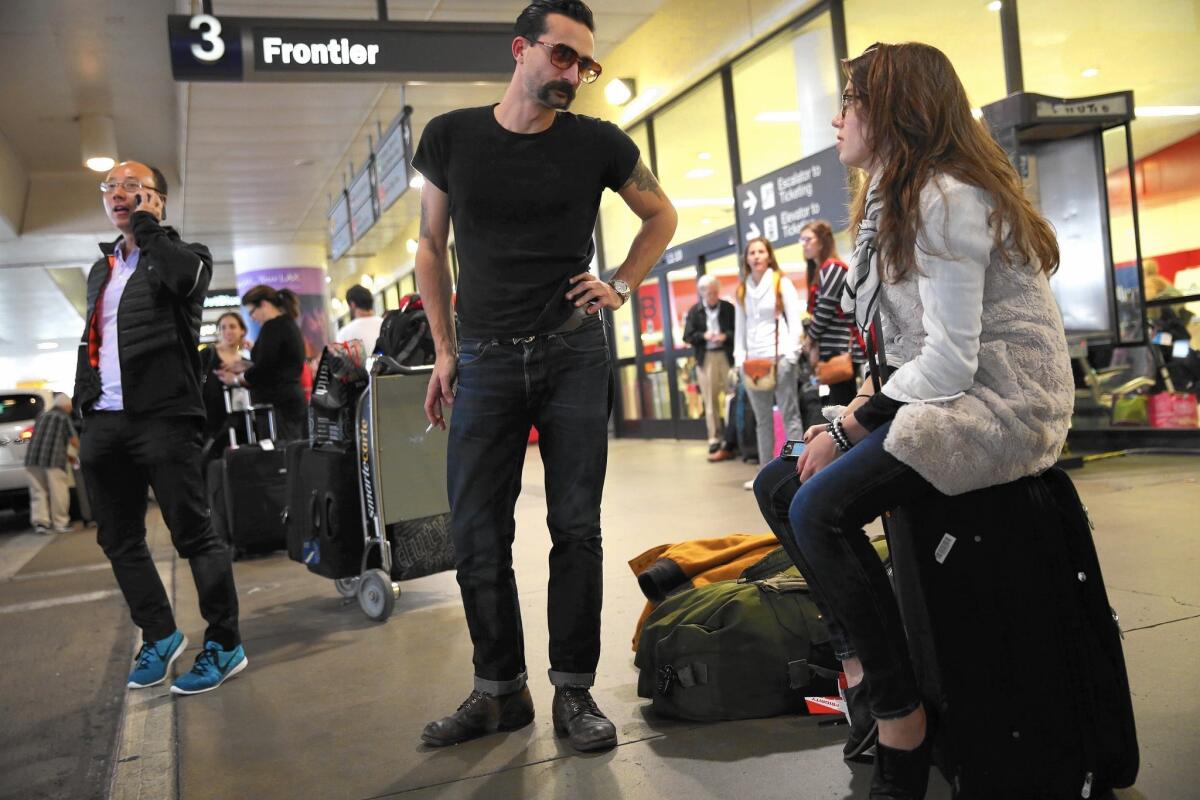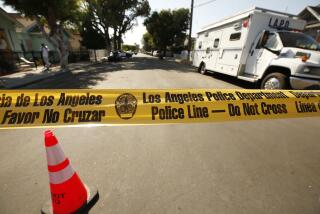After Paris, LAPD sees terror risk shifting across the city

- Share via
Counterterrorism efforts in Southern California have long focused on the region’s distinct landmarks. Los Angeles International Airport, the intended target of a terrorist driving a vehicle filled with explosives in 2000. The U.S. Bank tower in downtown L.A., mentioned in Al Qaeda documents as a possible 9/11 mark. And, of course, Disneyland.
But the coordinated attacks in Paris — where 130 people were killed at cafés, outdoor terraces and a concert hall in several parts of the city — has officials reassessing the threat. In addition to protecting famous attractions, authorities say they need to focus more on lesser-known gathering places where a few terrorists could carry out a devastating attack.
“Iconic and symbolic targets are not as high on terrorists’ priority list as killing high numbers of people,” said Michael Downing, the Los Angeles Police Department’s anti-terrorism deputy chief.
Beyond Paris, experts point to a terrorist attack on a Kenya university this year that killed nearly 150 people as well as the 2008 attacks in Mumbai, India, where multiple places were targeted at the same time to maximize the body count.
Authorities are now broadening their view of seemingly ordinary locations where the masses gather. Bus and railway stations, malls, event venues — they are now perceived to be on par with the Rose Bowl and Dodger Stadium when it comes to risk assessment.
In the wake of Paris, security was increased at popular shopping areas and public transportation depots across Los Angeles County.
The LAPD beefed up its presence outside a Justin Bieber concert and the Sheriff’s Department increased its communication with security at restaurants and movie theaters. Authorities were on high alert for any local chatter from those emboldened by what happened in Paris.
NEWSLETTER: Get the day’s top headlines from Times Editor Davan Maharaj >>
“Terrorists, for the most part, attack soft targets,” said terrorism expert Brian Michael Jenkins, who recently testified before the Senate about homeland security and Paris. “About 80% of all terrorist attacks are carried out at places without a security perimeter or guards. The presence of a single guard at the soccer stadium stopped a horrific bombing in Paris. Terrorists look for places they don’t have to penetrate or face a challenge.”
Los Angeles — with its urban sprawl and pockets of neighborhoods each with their own favored public locales — offers numerous targets for terrorists looking for venues where many people gather. A synchronized attack on multiple locations could paralyze L.A. in the same way it did in Mumbai, said Jenkins, senior advisor to Rand Corp.’s president.
“Can we protect all the soft targets in L.A.? No, realistically,” he said. Most of the killing, he noted, happens in the first few minutes when law enforcement has yet to respond. He added that the key is gathering enough intelligence information to prevent an attack.
LAPD and sheriff’s officials made plans to travel abroad to glean information and advice from Paris law enforcement on responding to a multi-targeted event.
Last week, an elite LAPD unit trained to respond to terrorist attacks was summoned to a parking lot near the L.A. Coliseum for a surprise training drill. As sirens wailed and a police helicopter sputtered above, more than 150 officers sporting tactical vests and helmets and clutching rifles were briefed on simulated concurrent threats: An explosion at the Long Beach Aquarium. A shooting at a Van Nuys recruitment center. An attack at the Howard Hughes Center.
“What you saw in Paris was a game-changer in many ways,” Downing declared into a bullhorn. “For the past several years we’ve been preparing for lone wolves — one or two people hitting one or two locations. This was layered. It was complex. It was coordinated.”
The lot is one of several staging areas in the city where officers would convene before being deployed to respond to a terrorist attack. LAPD’s Operation Archangel is constantly updating its running list of soft and hard terrorism targets.
“It’s not an if, it’s a when,” Police Commission President Matt Johnson said.
LAPD Chief Charlie Beck said the Paris attacks offered critical lessons.
“You always have to evolve with the threat,” he said.
Protecting “soft targets” has long been an issue in Los Angeles. For years, experts have expressed special concern about LAX, saying the airport is vulnerable to truck and car bombs that could be detonated next to crowded terminals and sidewalks. Officials have said they have boosted security dramatically since 9/11.
But since then, the airport has been the scene of two violent incidents.
In 2002, a gunman attacked the El Al Israel Airlines ticket counter, killing two people and wounding several others before a security guard working for El Al fatally shot him. In 2013, a gunman roamed through a terminal with an assault-style rifle before killing a TSA officer.
The approaching holiday season has agencies on their toes. Los Angeles County Sheriff Jim McDonnell said deputies will increase their visibility across the region. He noted that the weapons and explosives used in the Paris attacks are readily available in Southern California.
He declined to go into specifics on counterterrorism plans, but acknowledged that law enforcement was limited when it came to dealing with a vast landscape.
“At the end of the day, an engaged public comfortable with reporting what they see is just as important,” McDonnell said. “It is time for the police and community to come together. There are too few officers protecting many so the public’s eyes and ears are the key. You can no longer think someone else will report that bag.”
But reporting potential terrorist activity needs to be done with care and should not involve racial profiling, authorities said.
“Our Muslim community is probably our greatest strength right now,” Downing said. “Anti-Muslim acts and backlash actually hurt counterterrorism and create a breeding ground for wannabes.”
The local Muslim community has long partnered with law enforcement, sharing information and keeping communication lines open.
That’s why it stung when media narratives made sweeping statements about Muslims after the Paris attacks, said Salam Al-Marayati, president of the Muslim Public Affairs Council.
“We’re doing everything we can in terms of partnership and being proactive, helping build better programs in our community, more civic engagement and more intervention programs,” he said.
“American Muslims have spoken out vociferously against the ISIS ideology and have basically erected a wall of opposition to them.”
Al-Marayati said interfaith meetings also help foster a united front when it comes to prevention.
Officials caution the public against overreacting to the bumped-up security. The odds of being killed in a terrorist attack remain minuscule. But an increase in awareness is beneficial for everyone.
“In the wake of every attack, everyone does a review and takes it up a few notches,” said Jenkins. “It’s not a bad thing. It reminds us terrorism is real.”
ALSO
‘Full House’ actor John Stamos convicted of DUI in Beverly Hills
4 arrested in vandalism of Bay Area dam that caused loss of 50 million gallons of water
Man dies at O.C. Starbucks after being struck by skateboard
More to Read
Sign up for Essential California
The most important California stories and recommendations in your inbox every morning.
You may occasionally receive promotional content from the Los Angeles Times.













